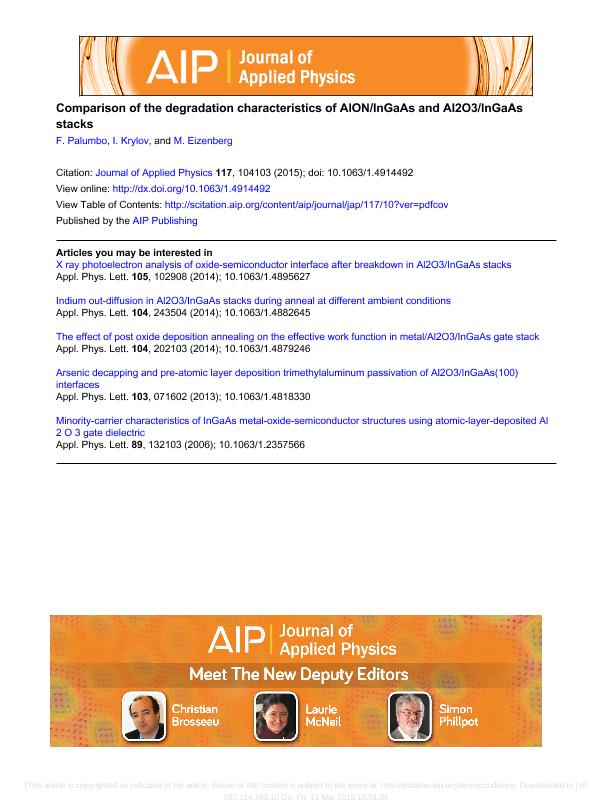Mostrar el registro sencillo del ítem
dc.contributor.author
Palumbo, Félix Roberto Mario

dc.contributor.author
Krylov, I.
dc.contributor.author
Eizenberg, M.
dc.date.available
2018-03-01T21:09:06Z
dc.date.issued
2015-03
dc.identifier.citation
Palumbo, Félix Roberto Mario; Krylov, I.; Eizenberg, M.; Comparison of the degradation characteristics of AlON/InGaAs and Al2O3/InGaAs stacks; American Institute of Physics; Journal of Applied Physics; 117; 10; 3-2015; 1-8
dc.identifier.issn
0021-8979
dc.identifier.uri
http://hdl.handle.net/11336/37638
dc.description.abstract
In this paper, the degradation characteristics of MOS (Metal-Oxide-Semiconductor) stacks with Al2O3/AlON or Al2O3 only as dielectric layers on InGaAs were studied. The dielectric nitrides are proposed as possible passivation layers to prevent InGaAs oxidation. At negative bias, it has been found out that the main contribution to the overall degradation of the gate oxide is dominated by the generation of positive charge in the gate oxide. This effect is pronounced in MOS stacks with Al2O3/AlON as dielectric, where we think the positive charge is mainly generated in the AlON interlayer. At positive bias, the degradation is dominated by buildup of negative charge due to electron trapping in pre-existing or stress-induced traps. For stress biases where the leakage currents are low, the changes in the electrical characteristics are dominated by electron-trapping into traps located in energy levels in the upper part of the semiconductor gap. For stress biases with higher leakage current levels, the electron trapping occurs in stress-induced traps increasing the shift of VFB towards positive bias. The overall results clearly show that the improvement of the high-k dielectric/InGaAs interface by introducing N into the Al-oxide does not necessarily mean an increase in the reliability of the MOS stack.
dc.format
application/pdf
dc.language.iso
eng
dc.publisher
American Institute of Physics

dc.rights
info:eu-repo/semantics/openAccess
dc.rights.uri
https://creativecommons.org/licenses/by/2.5/ar/
dc.subject
Iii-V Mos Stacks
dc.subject
Reliability
dc.subject
High-K Dielectrics
dc.subject.classification
Nano-materiales

dc.subject.classification
Nanotecnología

dc.subject.classification
INGENIERÍAS Y TECNOLOGÍAS

dc.title
Comparison of the degradation characteristics of AlON/InGaAs and Al2O3/InGaAs stacks
dc.type
info:eu-repo/semantics/article
dc.type
info:ar-repo/semantics/artículo
dc.type
info:eu-repo/semantics/publishedVersion
dc.date.updated
2018-02-28T14:11:14Z
dc.journal.volume
117
dc.journal.number
10
dc.journal.pagination
1-8
dc.journal.pais
Estados Unidos

dc.journal.ciudad
New York
dc.description.fil
Fil: Palumbo, Félix Roberto Mario. Technion - Israel Institute of Technology; Israel. Consejo Nacional de Investigaciones Científicas y Técnicas; Argentina
dc.description.fil
Fil: Krylov, I.. Technion - Israel Institute of Technology; Israel
dc.description.fil
Fil: Eizenberg, M.. Technion - Israel Institute of Technology; Israel
dc.journal.title
Journal of Applied Physics

dc.relation.alternativeid
info:eu-repo/semantics/altIdentifier/doi/http://dx.doi.org/10.1063/1.4914492
dc.relation.alternativeid
info:eu-repo/semantics/altIdentifier/url/http://aip.scitation.org/doi/10.1063/1.4914492
Archivos asociados
